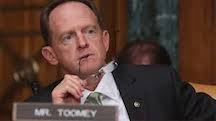The Trump administration has promised two senators that the administration will set up a system of exclusions for the next round of proposed tariffs on Chinese goods.
If trade talks with China don’t produce a deal by March 1, the White House has scheduled an increase in tariffs to 25 percent from 10 percent on $200 billion of Chinese goods.
Republican Senator Pat Toomey of Pennsylvania and Alabama Democrat Doug Jones have pressed the office of the U.S. Trade Representative to develop a process whereby some importers can apply for exclusions from the new tariffs, similar to what’s already in place for tariffs on about roughly $50 billion worth of Chinese imports.


USTR responded in a letter to Toomey and Jones with a promise that exclusions will be allowed. “If the duty rate on the $200 billion tariff action is raised to 25 percent, USTR will initiate an appropriate exclusion process,” according to the letter dated Jan. 11.
Decisions on exclusion requests for tariffs on Chinese imports are based on whether a product is available only from China, if duties “would cause severe economic harm” to the company or U.S. interests, and whether the item is strategically important, according to USTR.
There is no exclusion process for the current 10 percent tariffs on $200 billion worth of goods.
In an emailed statement, Toomey said “tariffs are taxes” that hurt American consumers and workers.
“While I appreciate USTR creating an exclusion process for its third list of 301 tariffed-products, my hope is the administration and China reach an accord that ends this incipient trade war and rescinds the tariffs,” Toomey said.
Tense Talks
The U.S. and China are trying to advance tense trade negotiations that have rattled markets for months. Officials from both sides expressed optimism after mid-level talks wrapped up in Beijing last week, bolstering sentiment across global markets.
Chinese Vice Premier Liu He is set to visit Washington on Jan. 30-31 for further trade talks, according to people familiar with the plans, signaling progress in efforts to tamp down the dispute. Liu is expected to meet with U.S. Trade Representative Robert Lighthizer.
The USTR began posting determinations in December on requests from the initial $34 billion in duties on Chinese goods that took effect last July. Of the 10,830 requests posted as of Jan. 10, 985 had been granted and 1,731 denied, according to data posted online.
The remaining requests were in different stages of review, including more than 1,500 being examined by U.S. Customs and Border Protection “to determine whether an exclusion would be administrable,” according to the USTR.
Tariff Exclusions
There have been no determinations yet on then more than 2,500 exclusion requests posted as of Jan. 10 for the second tranche of tariffs imposed on $16 billion of Chinese imports in August, according to USTR.
Among the entities getting approvals so far are Mercury Marine for certain outboard engines and the Retail Industry Leaders Association on behalf of members importing water coolers, data show. Rejections include products from Cummins, BASF and Kimberly-Clark.
The partial government shutdown has delayed Customs and Border Protection from entering the approval of exclusions into its system, according to a person briefed on the matter, meaning companies need to continue paying the tariff for now. It could take at least 10 days after the shutdown is resolved to reboot the system, the person said.
The USTR office said on Monday that trade negotiations and enforcement will continue even as the agency responds to a lapse of funding amid shutdown.









